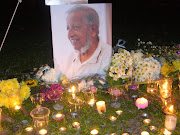 See my earlier post about this case
See my earlier post about this caseThe news that John Tan, Shafi'ie and Isrizal (left to right in the picture) have been found in contempt of court is hardly surprising. Doesn't mean i'm not very disappointed and angered. (Sentencing is on 27 Nov, 9.30am, Court 6B)
The Attorney-General's Chambers (AGC) actions are akin to a big schoolyard bully. Ask such bullies to take on someone their own size and they'll either keep quiet or back away. That's probably the reason why they don't go after the International Bar Association's Human Rights Institute for their July 08 report or Lawyers' Rights Watch Canada for their Oct 07 report.
The following section is from yawning bread's article Conversation stoppers. Read the full article here.
The Attorney-General's Chambers (AGC) actions are akin to a big schoolyard bully. Ask such bullies to take on someone their own size and they'll either keep quiet or back away. That's probably the reason why they don't go after the International Bar Association's Human Rights Institute for their July 08 report or Lawyers' Rights Watch Canada for their Oct 07 report.
The following section is from yawning bread's article Conversation stoppers. Read the full article here.
With the advent of Walter Woon as Attorney-General, another conversation-stopper has been revived -– the contempt of court charge. Or was it in response to the sharp criticisms levelled by International Bar Associations' Human Rights Institute (IBAHRI) in its report published July this year?
The 72-page report had examined various instances over the years of questionable court decisions in political cases. It also put under the spotlight the fact that Supreme Court appointments often have no tenure, or are subject to renewal, which thus "casts doubt on the independence of all decisions made by judges."
The Wall Street Journal Asia, in covering this story, got into trouble for it.
Dow Jones, the newspaper's publisher, is currently facing contempt of court charges, together with editors Daniel Hertzberg and Christine Glancey. The Attorney-General's office claims that an editorial published in the newspaper, titled "Judging Singapore's Judiciary" alleged that the judiciary is "not independent" and "is biased and lacks integrity", as did another, titled "Democracy in Singapore". The latter was about on an exchange in court between Singapore’s Minister Mentor Lee Kuan Yew and Chee in a separate defamation case filed by Lee against the opposition leader.
Cited too was a letter to the editor by the opposition Singapore Democratic Party leader Chee Soon Juan, published in the daily on 9 July, touching also on the IBAHRI report.
Dow Jones issued a statement 4 November 2008, asserting their innocence and right to fair comment. "Today in court we defended our right to report and comment on matters of international interest, including matters concerning Singapore," it said.
"We also argued that in this instance, what we published simply does not constitute contempt of court."
Denying complaints that the court action was an infringement of free expression, Woon said the case was "not about the freedom of speech per se" but "about the rule of law and the vital role that the courts and judiciary play in its maintenance."
We'll come back to this later.
Not only are big media companies being charged with contempt of court, but so are intrepid activists John Tan, Isrizal Mohamed Isa and Muhammad Shafi'ie Syahmi Sariman. They are facing similar charges in a case separate from that of the Wall Street Journal, for wearing white T-shirts emblazoned with a grey kangaroo in judge's robes and holding a gavel. The prosecution alleges that in wearing such a T-shirt, they intended to convey the sense that Singapore courts are "kangaroo courts".
At the time, they were in the Supreme Court building to witness a hearing to assess damages against opposition leaders Chee Soon Juan, Chee Siok Chin and the Singapore Democratic Party, after the trio had been found by a court to have defamed Minister Mentor Lee Kuan Yew and Prime Minister Lee Hsien Loong.
According to Today newspaper, at one point, John Tan uttered the words "This is a kangaroo court" as Lee Kuan Yew walked past him in the building.
What good do such prosecutions do? Woon argued that it was to protect the rule of law. But is it necessary to shield courts and judges from criticism to achieve this?
Is it totally inconceivable that judges can be biased, that executive interference can occur? Just look at some countries, say, China, India, Malaysia or Turkey. If it can happen there, it can happen here.
And when someone believes it is happening, should it not be said? How do you cure an ill if you're not even allowed to draw attention to it? Do we put our judges in the same class as God, the Prophet and the Koran, infallible, beyond question or demurral?
If we are so concerned about safeguarding the integrity of our justice system, then make sure our courts act with the utmost impartiality and never even give the appearance of susceptibility to undue influence.
Penalising people for saying that our courts do not meet expected standards does not improve justice. It's just a conversation stopper. A silencer. Some might say that resorting to it is an admission that one cannot win the debate on evidence alone, in other words, it just gives people more reason to believe what one is trying to deny.
Drop the charges before we make an even bigger joke of the system.














1 comment:
FOR GOD'S SAKE IT'S JUST A TSHIRT! KESIAN LAH ORANG2 NI
Post a Comment